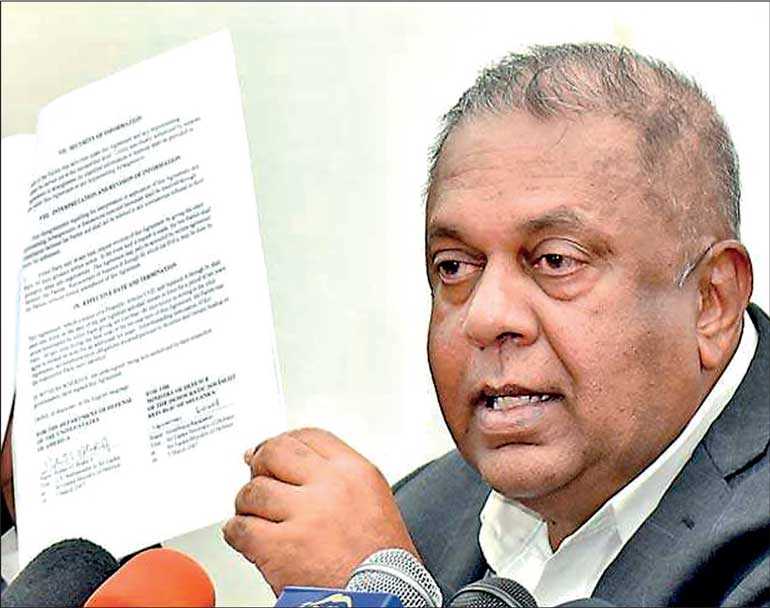Saturday Feb 21, 2026
Saturday Feb 21, 2026
Thursday, 14 November 2019 00:00 - - {{hitsCtrl.values.hits}}

Release of the draft MCC agreement by the Ministry of Finance 1 November, followed by an open challenge by Minister Samaraweera to show if there are any harmful aspects in the MCC to the country, a fast unto death by a venerable Buddhist monk against it, resulted in the Cabinet postponing the  signing of this agreement until the conclusion of the Presidential Election to be held on 16 November.
signing of this agreement until the conclusion of the Presidential Election to be held on 16 November.
In the meantime based on several petitions filed by many parties in the Supreme Court (SC), the SC has decided to determine whether a fuller bench should be nominated to hear them. The Petitioners inter alia allege that the compact will lead to a bartering of the sovereignty of the country and claim there is a serious danger to Sri Lanka’s interests being subdued in favour of the US.
Minister Mangala Samaraweera takes a strong position to defend the agreement and claims that much of the information given by interested parties is false and baseless. According to him: “The project proposal under the MCC is to provide funds to be used for projects based on prioritisations indicated to them by the Government.” In light of these bewilderments it is prudent to examine some of the important and salient issues encircling it.
Background status
There are many factually incorrect positions which have been highlighted in defence of this agreement. If we trace the chronological history we come across several debatable instances.
I. US President George Bush proposed a new concept for a compact on development of poor countries with more accountability in March 2002. Accordingly the MCC was established as a bipartisan body in 2004. The eligibility of the recipient of assistance was subject to a policy performance to be assessed by US under 17 policy indicators set out by them
II. Minister Samaraweera has stated that in his capacity as the Minister of Foreign Affairs during a previous Government he was asked by former President Mahinda Rajapaksa to discuss with the US
Government to get assistance under the MCC
III. According to program overview, Annexure 1 (of the draft MCC agreement) it is in December 2015 that the Board of Directors selected Sri Lanka to develop a threshold program. During the threshold program an analysis of the growth constraints was conducted jointly by the MCC, the Government and the HCID which was completed in November 2016
IV. Prime Minister Ranil Wickremesinghe’s economic statement in Parliament on 27 October 2016 has no reference to any proposed economic corridor extending from Colombo to Trincomalee or about a pending proposal for US assistance on the lines of the MCC project
V. In December 2016, MCC’s Board of Directors selected Sri Lanka to develop a compact and accordingly the Government recruited the compact development team and started work from an office established in the PM’s office of Policy Development
1. The Government and the MCC of the US prepared a constraint analysis in partnership with Harvard University’s Center for International Development for a compact with the MCC. In November 2017 the Government submitted project proposals focusing on the constraints identified
2. Two principal constraints were identified
I. The traffic congestion in the CMR and the poor interregional transport infrastructure
II. Lack of access to State lands and private lands for investment purposes was identified as a constraint for foreign and domestic investment, affecting growth-manufacturing, agriculture, construction, residential and commercial development, and tourism.
The proposed changes under MCC were intended to improve:
According to this sequence of events there is no indication of any initiation by a Mahinda Rajapaksa Government to obtain any grants under the MCC for such a project. That creates doubts about the veracity of Minister Mangala Samaraweera’s statement. The question that arises is why should he refer to something that did not happen? Is it just a ruse to show that even the previous Government wanted to do this?
Certain other positions taken by the Minister in his resolute defence of the MCC are also questionable:
All these conjectures point towards one important concern. Why is the donor country granting such a facility to a recipient country demanding acceptance by force? Will the US go to the extent of crippling our economy by applying sanctions if the decision is reversed by our country due to special reasons affecting us? Minister, doesn’t it amount to some kind of insult to the US to announce such apprehensions?
Let us examine some of the controversial contents in the compact draft agreement.
a) If the country receiving MCC funding is engaged in activities that are contrary to the national security interests of the US, it leads to the termination of the grant and request the Government (recipient) to repay to the MCC in dollars the value of the funding within 30 days (article 5, section 5.1 [b] v of the draft agreement). The national security interest of the US is a very wide term to be interpreted by them!
b) The Government agrees that MCC and the US or any current or former officer or employee of the MCC or the US Government. shall be immune from the jurisdiction of all courts and tribunals of Sri Lanka for any claim or loss arising out of activities or omissions (Section 6.7 under this compact)
c) The parties understand that consistent with SL Law, prior to the Government sending the letter of acceptance, this compact is to be submitted and enacted by the Parliament. Emphasis ours. This becomes an Act of Parliament?
In the program review under the background and the sub-title ‘consultative process’, it is stated as follows,
I. In December 2015, a constraint analysis was conducted by the Government, MCC and the HCID which was completed in November 2016
II. Lack of access to State land and private land for investment purposes was identified as a deterrent to foreign investment
III. Creating a dynamic market for land is also a policy stated in the Vision 2025 development plan of the Government. This was announced in September 2017. It follows that the MCC/HCID economic analysis preceded the 2025 vision plan. Hence the initiation of the project proposal for the MCC was not based on a national priority identified by the Government as stated by Samaraweera, but a later development on the findings of the HCID/MCC analysis
Highlights of the MCC project proposal
The program consists of two projects, a Transport Project and Land Project which is described in detail as follows under the objectives
a) To increase the relative efficiency and capacity of the road network and bus system in the Colombo Metropolitan Region (CMR) and to reduce the cost of transport in order to facilitate the flow of passengers and goods between the central region of the country and ports
b) To increase the availability of information on private land and underutilised State land in order to increase the land market activity
It is noteworthy that in 2016, a report was published by two of our researchers from the university entitled ‘Reducing Traffic Congestion in Colombo Metropolitan Area through Adaptation of Alternative Transporting Methods: Barriers and Long-Term Strategies’.
This was a fairly comprehensive approach by our local specialists who addressed the issue in a more domestic background. No attention apparently has been paid to this exercise. It may be that sometimes the HCID would have got the basics for their recommendations from this report at no cost!
Regarding the Land Policy there are certain intriguing points that should be focused on. According to the Draft Agreement the Land Policy broadly encompasses the following.
Among the several proposals under this scheme the most significant are:
I. Convert permits and grants in State land to ‘Absolute Land Grants’ which can get registered as freehold land
II. To support the conversion of State lands to the private domain, creating a marketable and bankable title in the name of the land holder
III. Government shall allow the use of land as collateral for loans and their free transfer
IV. The Land Special Provisions Act is expected to define the process the Government shall use for this conversion of land rights
V. The MCC funding for this activities is conditional on the enactment of the LSPA with the above facilities (Page 30)
VI. MCC believe that the title system would help to stimulate greater land market activities leading to investment and economic growth. MCC funding is conditional upon the enactments of amendments to remove difficulties in moving deeded properties to title system
The main focus of the MCC is to promote the land market activity more than the development of land by the present owners or the State. It is a matter that requires serious comprehension in the context of sovereignty and unlimited land ownership by foreigners.
Strangely this focus coincided with the published findings of certain other internationally financed think tanks operating in our country. They claimed that most of the prime real estate blocks owned by the Government are presently utilised in a manner that “greatly outweigh their economic value” and they should be brought under the management of an independent body free of political influence to minimise corruption.
To establish the point stressed by them, they issued a statement in a sponsored publication to the effect that Sri Lanka was given a low ranking for “weaknesses in the legal system and property rights”. Some of these foreign experts headed by the HCID, recommended the creation of a Public Enterprise Board ACT on the Tamasek Model of Singapore.
This Board as was explained by Minister Kabir Hashim would be empowered to “sell or dispose of, turn to account or otherwise deal with any property vested in the Public Enterprise”.
It is also interesting to note that the HCID is co-financed by multimillion dollar currency speculator George Soros. He also happened to be one of the prospective world class investors supposed to invest in Sri Lanka immediately after the new Good Governance Government came into power as announced by the then finance Minister Ravi Karunanayake.
Looking at all these we could see a full nexus of a wide circle operating behind the policymaking activities including the projected International Compacts and Grants. In the context the following concerns should be seriously addressed.
Maybe our pending legal actions will address these issues.